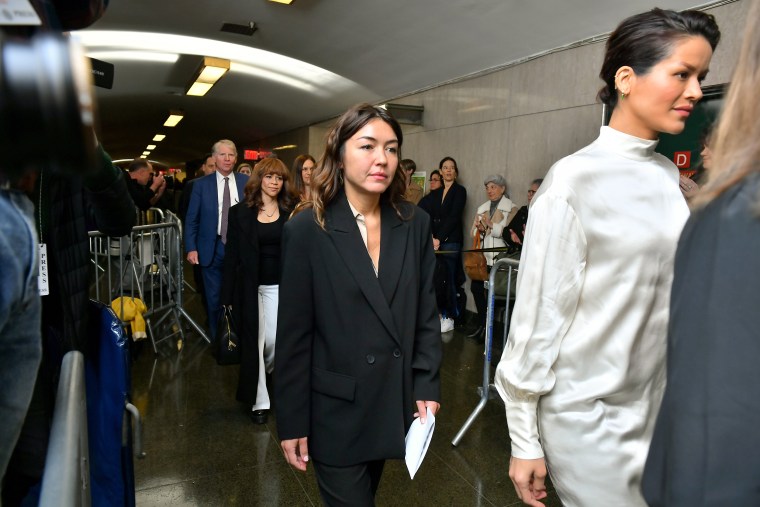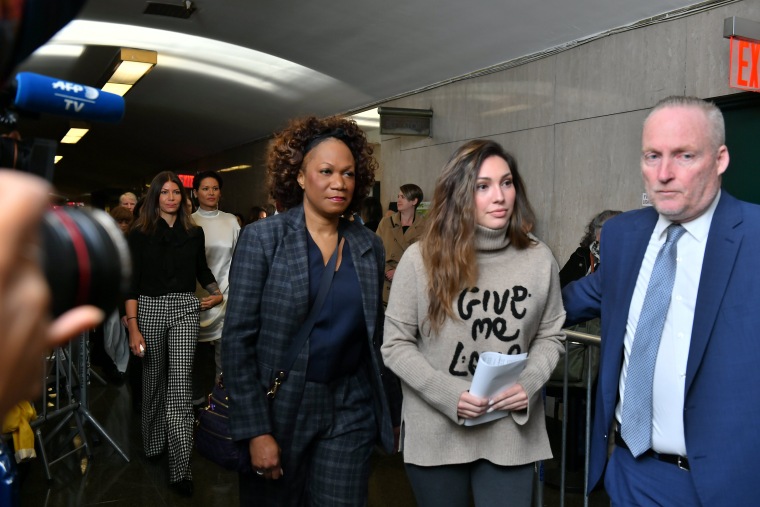Harvey Weinstein, who was convicted of rape in a landmark #MeToo trial, remained defiant as he was sentenced to 23 years in prison Wednesday, even as a group representing his accusers said "no amount of jail time will repair the lives he ruined, the careers he destroyed."
The sentencing was a seminal moment for the #MeToo movement, which sparked a worldwide reckoning on sexual assault and harassment more than two years ago. Weinstein, a once-celebrated Hollywood mogul, said ahead of his sentencing that he was worried about the movement's implication for men and due process.
A jury convicted Weinstein last month of third-degree rape of Jessica Mann, a former aspiring actress, and a count of criminal sexual act in the first degree against Mimi Haley, a former "Project Runway" production assistant.
Weinstein was sentenced to 20 years for criminal sexual act in the first degree and three years for rape in the third degree to be served consecutively for assaulting the two women in New York. He was also sentenced to 10 years of post-release supervision for both charges.
The former producer could have got as little as five years, but the judge's decision was much closer to the maximum 29 years he faced. The judge also said Weinstein must register as a sex offender.
Arriving in a wheelchair, Weinstein spoke ahead of his sentencing and addressed his role in the #MeToo movement, saying he believed "thousands of men are losing due process" and he was worried about the country.
He said he had "no great power" in the industry and couldn't "blackball anyone." He said he believed he had legitimate relationships with his accusers.
He added that he had not seen his children since the first article was published about the allegations against him, which he described as "hell on earth."
Several of his alleged victims sitting in the front row of the court cried as the judge read the verdict. Weinstein was led out of court immediately after in his wheelchair.
Ahead of the sentencing, Haley said that Weinstein's assault scarred her deeply, mentally and emotionally, and "crushed a part of her spirit." She said if he were not convicted, she believed he would victimize women "again and again and again."

Haley said she hoped the sentencing was long enough for Weinstein to acknowledge "what he's done and to be truly sorry."
Mann said Weinstein "used his power over the powerless" and her experience was "a recurring nightmare." She asked for him to receive the maximum sentence, calling it accountability for Weinstein.
"I'm not here to give any more power over to the man who stole my body," she said.
Lead prosecutor Joan Illuzzi-Orbon also asked for a maximum or a near-maximum sentence Wednesday, saying Weinstein "would never have been stopped from hurting more lives."
"He has been using and abusing people his whole life," she said.

Donna Rotunno, an attorney for Weinstein, said the sentencing in the case was "obscene" and "obnoxious" and "did not speak to the evidence that came out at trial." She said the sentencing was "cowardly" and she was "overcome with anger" at the decision.
Silence Breakers, a group that represents prominent Weinstein accusers, said after the sentencing that Weinstein's legacy "will always be that he's a convicted rapist."
"He is going to jail — but no amount of jail time will repair the lives he ruined, the careers he destroyed, or the damage he has caused," the group said.
NBC News legal analyst Danny Cevallos said the decision was "effectively a life sentence" and could have implications for his upcoming sex crimes case in California.
If he were to be convicted in that case, his New York convictions "will be treated as very serious prior convictions," which could lead to harsher sentencing in the second criminal case, Cevallos said.
Weinstein, 67, faced a minimum of five years in prison and a maximum of 25 years on the criminal sexual act count. The third-degree rape count carried a maximum penalty of four years behind bars.
The former film industry titan has denied all allegations of nonconsensual sex and pleaded not guilty in the New York case. His lawyers have said they will appeal the conviction.
In a filing last week, prosecutors pressed for a "fair and just punishment" without specifying a prison sentence for Weinstein. They outlined a series of sexual harassment and assault allegations against him, as well as claims of abusive behavior in the workplace.
The filing said the judge presiding over the case, Judge James Burke of the New York Supreme Court in Manhattan, is permitted by law to "consider all aspects of a defendant's life and characteristics," as well as a "broad spectrum of information" in weighing a sentence. Burke had advised jurors to consider only specific allegations laid out in the formal charges.
Weinstein's defense attorneys, for their part, requested that he be sentenced to five years. Damon Cheronis, one of the ex-producer's lawyers, argued that his client deserved leniency because of the "collateral consequences" he has faced due to the wave of allegations against him and the New York trial.
"Weinstein cannot walk outside without being heckled, he has lost his means to earn a living, simply put, his fall from grace has been historic, perhaps unmatched in the age of social media," Cheronis wrote in a letter to Burke.
Cheronis alluded to his client's "serious, ongoing health concerns."
In all, more than 80 women have accused the disgraced Oscar-winning producer behind "Pulp Fiction" and "The King's Speech" of sexual assault and harassment going back decades, though the charges were based primarily on allegations from Haley and Mann, who each testified during the trial.
The flood of allegations against Weinstein, first reported in October 2017 by investigative journalists at The New York Times and The New Yorker, fueled the global reckoning over sexual misconduct by powerful men in entertainment, the news media, finance and other high-profile industries.
He still also faces a sex crimes case in Los Angeles, where he is charged with raping one woman and sexually assaulting another in separate incidents on two consecutive days in 2013. He has yet to enter a plea in that case.
The Los Angeles County District Attorney's office is in the process of extraditing Weinstein for arraignment, DA Jackie Lacey announced after the sentencing.
Weinstein, who entered the courthouse most days hunched over a walker, was sent to Bellevue Hospital in February over concerns about high blood pressure and heart palpitations after his convictions. He was later transferred to an infirmary at the Rikers Island jail.
Weinstein returned to Bellevue on Wednesday after his sentencing, according to his publicist Juda Engelmayer. Staff at Rikers jail decided to take him back to the hospital as a precaution after Weinstein said he was having chest pains.


